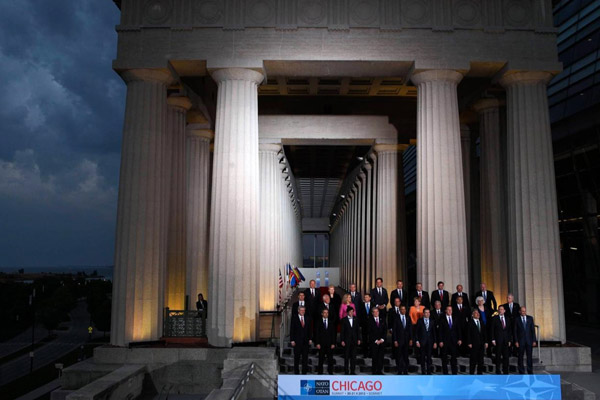
* I mentioned yesterday that lots of people had been asking what the point of the protests was, whether or not they were completely useless, and what the protesters wanted anyway. The funny thing is that people were asking the exact same questions about NATO: Stephen Walt, Tomas Ries, James Joyner, among others.
* Well worth reading: Afghan human rights after NATO hands off control to Afghan security forces; an excerpt from David Sanger's forthcoming Confront and Conceal: Obama’s Secret Wars and Surprising Use of American Power; "Obama's Debacle"; grading Obama at NATO.
* One of the very small items on NATO's agenda this weekend, though perhaps a clue to its future, was its Mediterranean piracy patrol, Operation Active Endeavour. I bring this up because "Operation Active Endeavour" is my favorite military operation name ever. Rather than being cloying (Operation Just Cause, often referred to as Operation Just 'Cause) or terrifying (Operation Rolling Thunder), it's wonderfully redundant, as close to "Operation Operation" as exists.
*#NONATO? On one hand, you can protest. On the other, you might just be able to wait around. The best place for less-varnished talk this weekend was the Young Atlanticist Summit, sort of Model UN for grad students and other 20-30somethings with lots of publications. Retired Senator Chuck Hagel and retired General Jim Jones addressed the subject "U.S. Security Policy After Chicago." Hagel, who served on both the Select Committee on Intelligence and the Committe on Foreign Relations, rephrased the question. "What the hell is the role? What are we supposed to do? Why do we need NATO?"
His answer: Afghanistan, for a couple more years at least, then we're not really sure. One new theater Hagel foresees as a unifying point for NATO is cyber warfare defense, which NATO is leading out of tiny Estonia's tech scene. Its Manual on International Law Applicable to Cyber Warfare, aka the "Tallin Manual," is due out later this year.
Jones suggested more Active Endeavors: "The west coast of Africa, from South Africa to Morocco, is a ocean highway for drugs, organized crime, and illegal activities of all kinds, human trafficking and the like…. This includes fisheries, an economic necessity for many of these countries. It would be astronomically cheap to get the public and the private sector working together to build coast guard capabilities with off-the-shelf technologies to fuse the capabilities of all the countries in Western Africa. I'm not saying NATO should do it for them, I'm saying NATO could be used as a training catalyist to bring this about. It's very inexpensive. That's the kind of proactive use of the alliance that would make everybody feel good.
"I've been to just about every one of them, and they all said the same thing: we don't know what's going on in our territorial waters. We're being overfished, we've got oil bunkering of serious proportions, and narcotics are coming up from South America, coming around the Horn, and coming up the west coast of Africa, most of it heading towards Europe."
Photograph: Chicago Tribune


